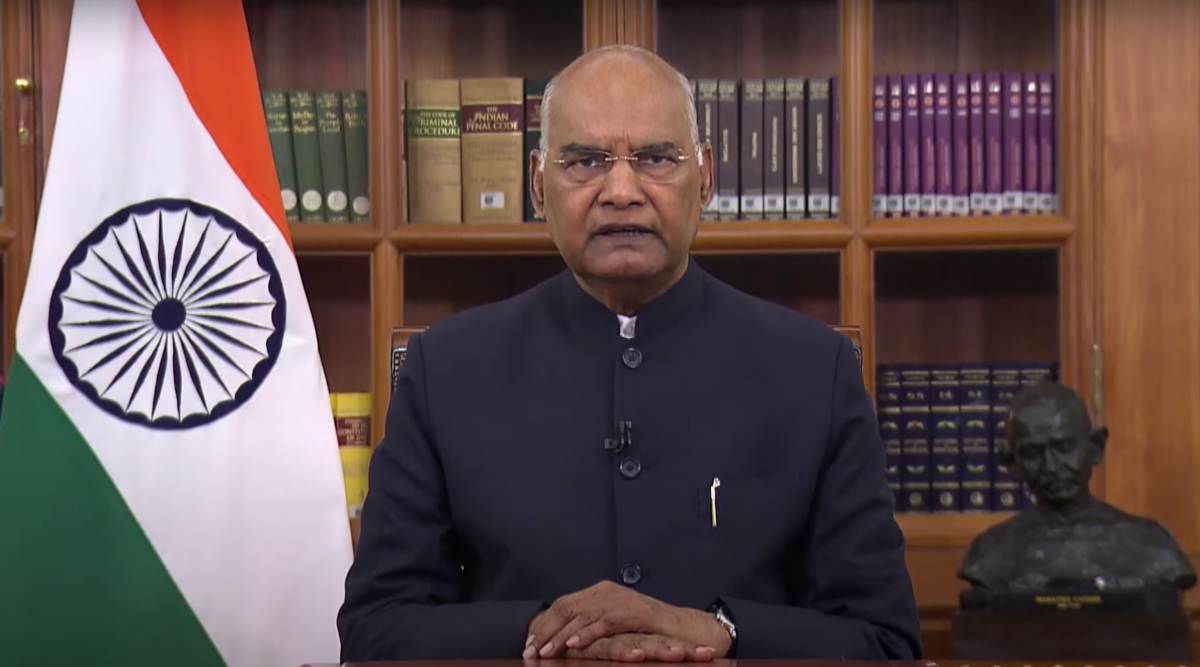 President Ram Nath Kovind addresses the nation on Sunday. (Photo: Videograb/Youtube@President of India)
President Ram Nath Kovind addresses the nation on Sunday. (Photo: Videograb/Youtube@President of India)Outgoing President Ram Nath Kovind in his farewell address to the nation Sunday said ‘Mother Nature’ is in deep agony and the climate crisis can endanger the future of this planet. President Kovind also spoke of being influenced by Mahatma Gandhi and being advised by former president Pranab Mukherjee.
“Mother Nature is in deep agony and the climate crisis can endanger the very future of this planet. We must take care of our environment, our land, air and water, for the sake of our children. In our daily lives and routine choices, we must be more careful to protect our trees, rivers, seas and mountains as well as all other living beings. As the first citizen, if I have to give one advice to my fellow citizens, it has to be this,” he said in his address.
Scripting history last week, NDA candidate Droupadi Murmu became the first tribal woman to be elected to the highest post in the country. She will take the oath Monday.
Kovind said the nation has been celebrating ‘Azadi ka Amrit Mahotsav’.
Subscriber Only Stories
“Next month, we will celebrate the 75th anniversary of Independence. We will enter the ‘Amrit Kaal’, the 25-year period leading to the centenary of Independence. These anniversaries are milestones on the journey of the Republic, a journey to discover its potential and to offer its best to the world. In modern times, the glorious journey of our country commenced with the awakening of nationalist feelings during colonial rule and the launch of the freedom struggle,” he said.
“When Gandhiji returned to the motherland in 1915, the nationalist fervour was gaining momentum. I have always strongly believed that no other country has been as fortunate as India in having a galaxy of leaders, each of whom was an exceptional mind, within a span of a few decades in the early twentieth century. Gurudev Rabindranath Tagore, like a modern-day ‘rishi’, was at work to help us find our cultural roots again, while Babasaheb Bhimrao Ambedkar was vigorously advocating the cause of equality that was unheard of in most advanced countries,” he added.
Kovind said that from Tilak and Gokhale to Bhagat Singh and Netaji, from Jawaharlal Nehru, Sardar Patel and Shyama Prasad Mukherjee to Sarojini Naidu and Kamaladevi Chattopadhyay – nowhere in the history of humankind have so many great minds come together for a common cause.
He added that Gandhi was the one whose transformative ideas influenced the outcome the most and who changed so many lives in the process.
“The formal map for the democratic path we all have been navigating was drafted by the Constituent Assembly. It included great minds from across the country, including 15 remarkable women such as Hansaben Mehta, Durgabai Deshmukh, Rajkumari Amrit Kaur and Sucheta Kripalani. The Constitution they prepared, with invaluable contributions from each of them, has been our guiding beacon. Values enshrined in it have been part of the Indian ethos since time immemorial,” he said.
“This trinity of ideals is lofty, noble and uplifting. They must not be mistaken for abstractions. Our history, not only of modern times but also from ancient times, reminds us that they are real; that they can be realized, and indeed have been realized in different eras. Our ancestors and founders of our modern nation exemplified the meaning of justice, liberty, equality and fraternity with hard work and an attitude of service. We only have to follow in their footsteps and keep walking,” he added.
Kovind quoted Dr Babasaheb Bhimrao Ambedkar’s concluding remarks in the Constituent Assembly where he had pointed out the distinction between political and social democracy.
“What does social democracy mean? It means a way of life which recognises liberty, equality and fraternity as the principles of life.
“These principles of liberty, equality and fraternity are not to be treated as separate items in a trinity. They form a union of trinity in the sense that to divorce one from the other is to defeat the very purpose of democracy,” Kovind quoted Ambedkar as having said.
Kovind also took a trip down memory lane and recalled his earlier days when the country had just achieved Independence and said, “There was a fresh wave of energy to rebuild the country; there were new dreams. I, too, had a dream, that one day I would be able to participate in a meaningful way in this nation-building exercise.”
“A young boy living in a mud house could not have any idea about the highest Constitutional office of the Republic. But it is a testament to the strength of India’s democracy that it has created pathways to let each citizen take part in the shaping of our collective destiny.
“If that Ram Nath Kovind from village Paraunkh is addressing you today, it is solely thanks to the inherent power of our vibrant democratic institutions,” he said.
- The Indian Express website has been rated GREEN for its credibility and trustworthiness by Newsguard, a global service that rates news sources for their journalistic standards.

